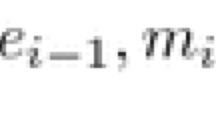Abstract
Recent works in epistemology show that the claim that coherence is truth conducive – in the sense that, given suitable ceteris paribus conditions, more coherent sets of statements are always more probable – is dubious and possibly false. From this, it does not follows that coherence is a useless notion in epistemology and philosophy of science. Dietrich and Moretti (Philosophy of science 72(3): 403–424, 2005) have proposed a formal of account of how coherence is confirmation conducive—that is, of how the coherence of a set of statements facilitates the confirmation of such statements. This account is grounded in two confirmation transmission properties that are satisfied by some of the measures of coherence recently proposed in the literature. These properties explicate everyday and scientific uses of coherence. In his paper, I review the main findings of Dietrich and Moretti (2005) and define two evidence-gathering properties that are satisfied by the same measures of coherence and constitute further ways in which coherence is confirmation conducive. At least one of these properties vindicates important applications of the notion of coherence in everyday life and in science.
Similar content being viewed by others
References
Bovens L., Hartmann S. (2003). Bayesian epistemology. Oxford, Oxford University Press
Dietrich F., Moretti L. (2005). On coherent sets and the transmission of confirmation. Philosophy of Science, 72(3): 403–424
Fitelson B. (2003). A probabilistic theory of coherence. Analysis, 63, 194–199
Fitelson B. (2004). Two technical corrections to my coherence measure. Manuscript.
Kemeny J., Oppenheim P. (1952). Degrees of factual support. Philosophy of Science, 19, 307–324
Laudan L., Leplin J. (1991). Empirical equivalence and underdetermination. Journal of Philosophy, 88, 449–472
Okasha S. (1997). Laudan and Leplin on empirical equivalence. The British Journal for Philosophy of Science, 48, 251–256
Olsson E.J. (2002). What is the problem of coherence and truth?. Journal of Philosophy, 94, 246–272
Olsson E.J. (2005). Against coherence: Truth, probability, and justification. Oxford, Oxford University Press
Salmon W.C. (1973). Confirmation. Scientific American, 228, 75–84
Shogenji T. (1999). Is coherence truth-conductive?. Analysis, 59, 339–345
Author information
Authors and Affiliations
Corresponding author
Rights and permissions
About this article
Cite this article
Moretti, L. Ways in which coherence is confirmation conducive. Synthese 157, 309–319 (2007). https://doi.org/10.1007/s11229-006-9057-5
Published:
Issue Date:
DOI: https://doi.org/10.1007/s11229-006-9057-5



